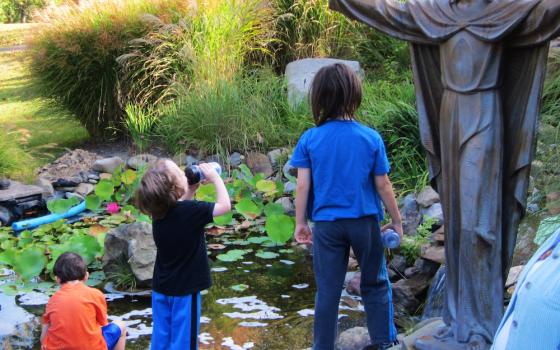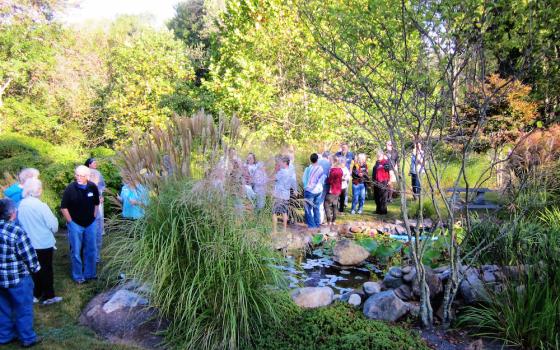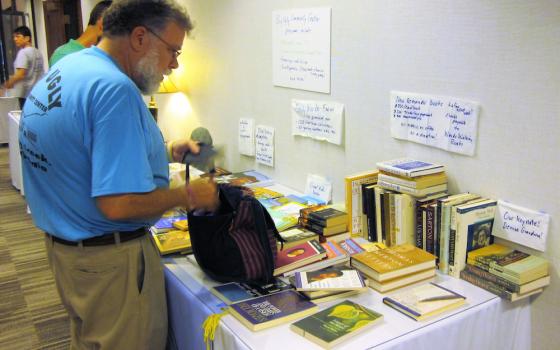Notes from the Field are reports from young women volunteering in ministries of Catholic sisters. The project began in the summer of 2015 when, working with the Catholic Volunteer Network, we enlisted four young women working in Honduras, Thailand, Ethiopia and the United States to blog about their experiences. The fall 2015 series presents two more women, both volunteering with sisters' ministries in the United States.
______
Since 1970, the Catholic Committee of Appalachia has existed to serve Appalachia and to address the issues this region faces, both communally and environmentally. As a membership-based organization, the CCA provides a community of solidarity and a network of support for people of faith working for social, economic and ecological justice in Appalachia. The CCA holds an annual gathering every fall, and this post is my reflection on the Sept. 18-20 gathering in Charleston, West Virginia:
After moving to central Appalachia, my husband and I found the community we have been missing at the annual gathering of the Catholic Committee of Appalachia.
For one weekend of the year, legions of passionate and environmentally and socially minded Catholics from the Appalachian Mountain states drive hours to attend the meeting, held this year in Charleston. The mission of the 2015 meeting was to study the water crisis on a local and global scale.
I consider myself relatively informed about the humanitarian crises happening throughout the world thanks to my college education. However, the CCA meeting blew apart my confidence that I could even understand the environmental tragedies in my own backyard. The drought in California is well known, and I expect global water wars to define much of my adult life, but until this conference, I had never given any thought to water issues in the eastern United States.
The conference began with a presentation from Dr. Ben Stout, a professor of stream ecology at Wheeling Jesuit University, about Big Coal's effects on the Appalachian water system. Stout's career was research-focused until he was called to court to testify in a series of cases against coal companies' work to reclaim mountaintop removal sites. When told that they needed to return the mined site to how it looked before, these companies would vehemently deny that the streams they removed had existed in the first place, presumably assuaging themselves of the guilt of rebuilding them.
Though Appalachia is a water-wealthy region, Dr. Stout provided evidence that this water supply is threatened. Toxic algae blooms from excess nutrients that come from chemical fertilizers are becoming larger and more frequent, and underground wells are continuously contaminated by mining.
In 2014, the coal cleaning company Freedom Industries suffered a massive chemical spill from a containment tank used to clean coal slurry that contaminated the Charleston water supply for days. The nonpolar molecule 4-Methylcyclohexanemethanol doesn't dissolve in water and can't be removed by flushing out tanks, causing this hard-to-detect toxin to linger in a water supply virtually forever. Dr. Stout said everyone in Charleston was risking their health unless they fully replaced their water heaters after the spill; the city government only suggested throwing out plastic dishes.
Another conference speaker, Dr. Laura Diener, a professor at Marshall University, spoke about the 2014 chemical spill in terms of poverty and inequality, indicating that income is a driving factor of safety when faced with contaminated water. Her field research and in-person interviews told a shocking story about accessibility.
During the spill, most affluent residents were able to buy bottled water, leave the region for a few days, or drive to various emergency tanks of safe water throughout the city. However, those without cars had difficulty getting to these tanks, and many were forced to drink from their taps anyway. Some of the tanks in the poorest neighborhoods were illegally filled with the contaminated water, and in some cases, prison inmates weren't given access to safe water until their families protested for days.
This was toxic water. Showering with it caused many to break out in rashes, and ingesting it caused nausea and lingering sickness. Over 700 people were stricken, and 16 were hospitalized. Yet some were still forced by lack of options to use it, even in baby formula.
This was no natural disaster, no act of God. This chemical spill was directly caused by inept safety measures by Freedom Industries and the coal industry as a whole.
This isn't an isolated problem. Spills like this happen a lot, and many regions of Appalachia are permanently cut off from their groundwater supply because of chemical contamination. Why was the Charleston spill different? Why did it make national and international news? Because for once, it affected an urban area. In the words of one of Professor Diener's interviewees:
"It's a good thing this spill happened to rich white people, too — otherwise, no one would pay attention."
Sadly, this lack of attention to the suffering of the rural poor is a common story in Appalachia. Dr. Shannon Bell, an assistant professor of sociology at the University of Kentucky, took part in an interactive conversation at the conference about how her research revealed the ways industries pollute rural communities.
In so many ways, the roots of communities and families run incredibly deep in this region. Yet these roots are being torn up as families become stymied in their attempts to stay and thrive in their home communities because of the poverty caused by the coal companies. Bell has collected story after story of women suffering from the ecological impacts of the industry. (Check out her book on her research, Our Roots Run Deep as Ironweed: Appalachian Women and the Fight for Environmental Justice.)
In one instance, a broken containment pond caused massive flooding in a mountain valley and almost carried away a woman's house with her children in it. Now, her children have nightmares every time it rains, and their home has lost all resale value. In another case, coal dust from a processing plant settles so thickly on the homes in the nearby community that some homes have depreciated in value from $144,000 to less than $12,000.
That loss is incredible enough, but it is made worse because living in such close proximity to coal factories dramatically raises one's risk of cancer. When the value of a home can depreciate almost 92 percent, what chance does a non-affluent family have to sell and move somewhere safer? More importantly, why should they have to? That is a loss of power. Without their consent, without their voices being heard, the people of Central Appalachia are being sacrificed for the energy needs of the rest of the world. And every time I turn on the hot water, I am contributing to their suffering.
This isn't a far-away problem. This is happening right here in America. It's affecting the lives of the students I work with. It has defined the lives of their parents and has limited the options for the next generation. The least we can do is to try to understand. After all, being informed is the first step to lasting change.
[Lydia Noyes and her husband, Ian, are volunteers with the Notre Dame Mission Volunteers AmeriCorps program. She is a 2015 graduate of Calvin College in Grand Rapids, Michigan. She has degrees in environmental studies and international development.]



